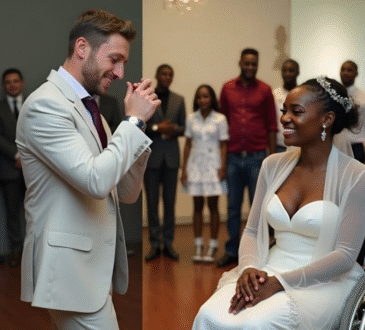
Cop pulls over black girl in luxurious car and arrests her. Then this happens:
In the early afternoon of a sunny July day, 19-year-old Alexis Thompson was cruising down a quiet road in her brand new luxury car. The car, a gift from her parents for her academic achievements and hard work, was a sleek black Mercedes-Benz. Alexis, an honors student at a prestigious university, had earned a scholarship and was known for her dedication and resilience.
As she turned onto a less traveled road, she noticed flashing lights in her rearview mirror. Confused, she glanced at her speedometer, confirming she wasn’t speeding. Nevertheless, Alexis pulled over to the side of the road and waited for the officer to approach.
Officer Daniel Roberts, a veteran cop in his late 40s, walked up to Alexis’s car with a stern expression. He had received a call about a suspected stolen vehicle matching the description of Alexis’s car and felt compelled to investigate. Unbeknownst to him, his actions that day would trigger a chain of events he couldn’t have anticipated.
“License and registration, please,” Officer Roberts demanded, his tone sharp and authoritative.
Alexis, feeling a mix of fear and confusion, complied. “Officer, may I ask why I’m being pulled over?”
“I’ll explain once I’ve checked your documents,” he replied curtly, taking her license and registration back to his patrol car.
After a few minutes, which felt like an eternity to Alexis, Officer Roberts returned. “Step out of the car, Ma’am.”
“Why? What’s going on?” Alexis asked, her voice trembling.
“We’ve received a report about a stolen vehicle that matches your car’s description,” he said, opening her door. “You need to come with me for questioning.”
“But this car isn’t stolen, it’s mine! My parents bought it for me,” Alexis protested, tears welling up in her eyes.
“Step out of the car now,” he insisted, grabbing her arm and pulling her out.
Alexis complied, but her mind raced. This has to be a mistake; she’d done nothing wrong. As Officer Roberts placed her in handcuffs, she felt a surge of humiliation and fear. Neighbors and passersby began to gather, watching the scene unfold.
Alexis was taken to the local police station where she was questioned for hours. She repeatedly explained that the car was hers, a gift from her parents, and she had all the necessary documentation to prove it. Despite her explanations, the officers treated her with suspicion and skepticism. Meanwhile, her parents, David and Karen Thompson, were frantic. Alexis hadn’t answered her phone, and they had no idea what was happening. When they finally received a call from the police station, they rushed over, hearts pounding with worry.
At the station, David and Karen demanded to see their daughter. After a tense exchange with the officers, they were finally allowed to meet her. Seeing Alexis in handcuffs, tears streaming down her face, filled them with a mix of anger and sadness.
“This is outrageous!” David shouted. “Our daughter has done nothing wrong. This car is legally hers. Here are all the documents proving it.” He handed over the paperwork, including the car’s purchase receipt and registration in Alexis’s name.
Officer Roberts and his colleagues reviewed the documents, and it became evident that a grave mistake had been made. Alexis’s car was indeed hers, and the report of a stolen vehicle had been a miscommunication. Realizing their error, Officer Roberts and the other officers apologized profusely. They released Alexis, but the damage had been done. She felt violated, humiliated, and traumatized by the experience.
Karen, holding her daughter tightly, said, “We’re going to make sure this never happens to anyone else.”
Over the next few weeks, the Thompson family sought legal counsel and decided to file a lawsuit against the police department for false arrest, racial profiling, and emotional distress. The news quickly spread, garnering widespread media attention. The incident sparked a heated debate about racial profiling and police misconduct. The community rallied around Alexis, supporting her and condemning the actions of the police. Protests were organized, demanding accountability and justice.
The story became a national headline, highlighting the systemic issues within law enforcement. The police department, under intense scrutiny, launched an internal investigation. Officer Roberts, who had initially dismissed Alexis’s pleas, found himself facing disciplinary action. The investigation revealed that he had acted on an unverified tip and had failed to follow proper procedures.
In the following months, the case went to court. Alexis, with the support of her family and legal team, testified about the traumatic experience and the emotional toll it had taken on her. The court ruled in favor of Alexis, awarding her a substantial settlement and mandating the police department to implement mandatory training on racial sensitivity and proper arrest procedures.
Officer Roberts, reflecting on his actions, felt a deep sense of regret. He’d let his biases cloud his judgment and had caused unnecessary pain to an innocent young woman. As part of the settlement, he was required to undergo extensive training and counseling.
The incident also led to broader changes within the police department. New protocols were established to prevent similar incidents from happening in the future. Officers were trained to handle situations with more care and respect, ensuring that citizens’ rights were protected.
For Alexis, the journey to healing was long and arduous. She struggled with anxiety and mistrust towards law enforcement. However, with the unwavering support of her family and community, she gradually began to rebuild her confidence.
Three years later, Alexis stood on the stage at her university’s graduation ceremony. She had persevered through adversity and had emerged stronger and more determined. As she delivered her valedictorian speech, she spoke about the importance of justice, equality, and resilience.
“We must continue to fight for a world where everyone is treated with dignity and respect, regardless of their race or background,” Alexis said, her voice filled with conviction. “Our experiences shape us, but they do not define us. We have the power to create change and build a better future for all.”
The audience erupted in applause, inspired by Alexis’s words and her incredible journey. Among the crowd, her parents beamed with pride, knowing that their daughter had not only overcome a great injustice but had also become a beacon of hope and inspiration for others.
In the end, the incident that had once shattered Alexis’s world became a catalyst for change, both within her community and beyond. It was a reminder that even in the face of adversity, courage and determination could lead to a brighter, more just future.




